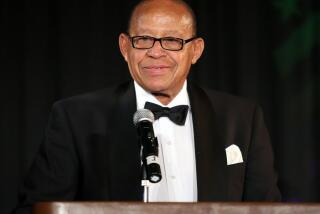Post Script
- Share via
Warren Cowan was Hollywood’s consummate publicist. From the time he and Henry Rogers founded Rogers & Cowan public relation in 1950 until Cowan passed away on May 14, he represented just about everyone who was anyone, including Frank Sinatra, Judy Garland, Cary Grant, Steve McQueen, Elizabeth Taylor and Elton John. When we asked him to write this column on May 13, we had no idea he had cancer. He accepted our assignment enthusiastically, immediately began dictating it to an assistant and, according to his assistant, finished it in about half an hour. It was his last day in the office--he was a professional until the very end.
--
The people who have worked for me over the last six decades tell me they remember two of my rules above all others. I’d like to think they’d remember more than that, but I guess it’s not a bad legacy.
One of my rules is always to have a pen and paper handy. This applies whether you’re wearing a tux at a black-tie premiere, or you’re a staffer being paged to “drop everything and see me,” or you have a chance meeting with a client on a weekend.
I never wanted to miss anything and didn’t want my staff to either. Writing everything down is the solution. I followed the rule myself, to the delight of dry cleaners around the world who were charged with cleaning my ink-stained clothes. As time went on, more staff members opted for thumbs on smart phones and PDAs instead of pen and paper. I still prefer writing, maybe because I never learned the fine art of speed thumb-typing.
My main rule, though, was to return every call. I moved through the evolution of message takers, from answering services to phone machines, voice mail, e-mails, text messages and now ring tones that demand, “Call me.” No matter the source of the message, I always felt that unless there was direct communication, there was always a chance of missing something important or getting something wrong.
I admit that when my voice mail is full of strangers’ messages asking for an address to send fan mail or proposing marriage to a client, I want to change my rule. No one wants to deal with those kinds of calls, but it’s a must.
Before there was Google, I was impressed when a fan or someone with an idea could track me down to contact my client. If someone knew enough to contact the Screen Actors Guild or the Directors Guild, or if they were ingenious enough to look up the unit publicist they saw during movie credits, I felt they deserved a call back.
I’m the kind of guy who sees everything as an opportunity, and that certainly helps in the world of publicity. I like to create news, to make things happen. So when I get a call out of the blue from someone who wants to speak with a big movie star because it’s the 200th anniversary of the star’s hometown, I see opportunity. It doesn’t mean the caller is going to speak with the star. But I can decide if whatever I’ve learned is a good enough hook to generate press to publicize the star’s new film or book.
We signed a lot of business over the years because of my policy of returning calls. Two aspiring stars--20 years apart in age and phone technology--called me and left messages explaining that I didn’t know them, but asking for industry advice. I called each of them back and answered some of their insightful questions about the business. One later became a successful director and hired my company because I’d taken his call decades earlier when he wasn’t famous. The other became a top stand-up comic who later got a TV series, and we did the PR for all the years it was on the air because, he said, I gave him a few minutes when no one else would.
When I began in the 1940s, an executive’s importance was measured by how many phones he had on his desk. We were forever reaching for the next call as soon as we hung up the phone we were on.
I’m still excited about who might be calling. My pockets, briefcase, car, office and home are full of phones. I don’t want to miss a call--or, in recent years, an e-mail--because I never know what the caller might be offering.
I sell Hollywood to the world. The least I can do is to show people that beyond just buying a movie ticket, an album or a book, the Hollywood they adore is accessible to them.
More to Read
The biggest entertainment stories
Get our big stories about Hollywood, film, television, music, arts, culture and more right in your inbox as soon as they publish.
You may occasionally receive promotional content from the Los Angeles Times.










